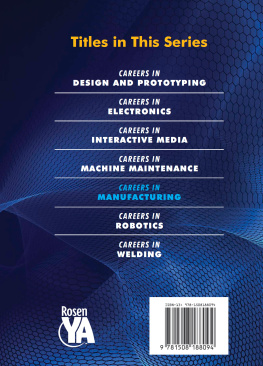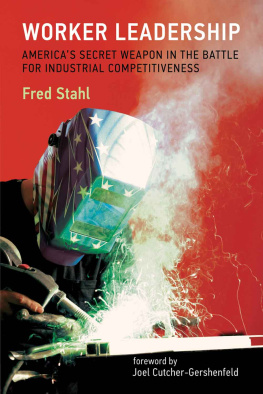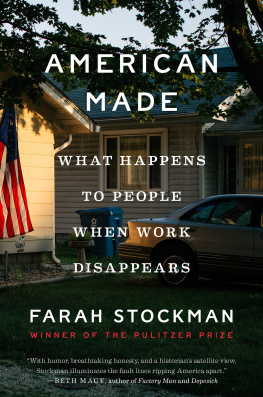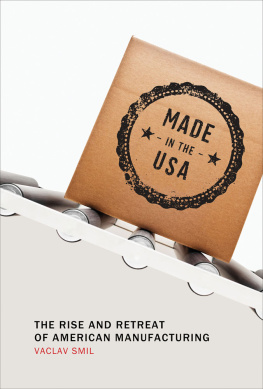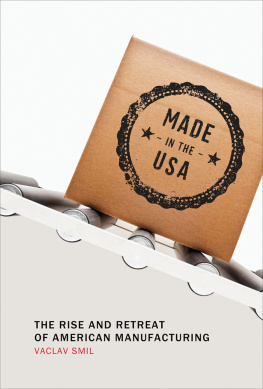American Made
Why Making Things Will Return Us to Greatness
Dan DiMicco

The author and publisher have provided this e-book to you for your personal use only. You may not make this e-book publicly available in any way. Copyright infringement is against the law. If you believe the copy of this e-book you are reading infringes on the authors copyright, please notify the publisher at: us.macmillanusa.com/piracy.
Contents
by David Rothkopf
Introduction
David Rothkopf
The United States finds itself at a critical juncture. Six years after the Great Recession began, millions of Americans still struggle with one of the weakest economic recoveries in a century. Job growth remains anemic, and wage growth for American workers remains low; in fact, wages are only up about 2 percent compared to a year ago, down from their 20-year prerecession average growth rate of 3.2 percent. Yet, at the same time, Wall Streetwhich helped precipitate the downturnis doing quite well. Both the Dow Jones Industrial Average and the S&P 500 shattered prerecession record highs in early 2013 and have continued to rise. And the banks that were too big to fail just a few years ago are going strong once again.
Something is broken in the economy.
The United States lost 8.2 million jobs in the last recession. Since January 2010, when the economy gradually began to show renewed signs of life, we have only succeeded in gaining those initial lost jobs back. During Barack Obamas first term in office, which includes 2009 when job losses were at their absolute worst, just 1.2 million nonfarm payroll jobs were recovered.
Although the official unemployment rate has fallen from its recession high of 10.2 percent to 5.9 percent, the real ratethe unemployed plus those involuntarily working part-time or who are marginally attached to the labor forceremains near 12 percent. Almost the entire decline in unemployment can be explained by millions of people who have dropped out of the workforce entirely. The labor participation rate in September 2014 was 63 percent, lower than at any time since the terrible double-dip recession of 198081. These are people who arent working or even looking for work. Some of them are retirees. Many more are able-bodied Americans in the prime of their working lives who have simply given up.
But the ills afflicting the U.S. economy cannot be blamed solely on the ravages of the Great Recession. Beyond the millions of jobs the recession swept away, the United States has lost 5.2 million manufacturing jobs since 2000. Only about one-third of those jobs were lost since 2008. During the height of the recession, more than 2 million construction workers were idle. Five years later, unemployment in the construction sector remained high at over 12 percent.
In the midst of this crisis, many Americans looked to the government for answers. What they found was dysfunction, bickering, and a seemingly unending series of distractions.
Clearly, something is broken in government too.
Under these circumstances, where can Americans look for insight and vision? The solution has to be in the private sector. But it wont be in the financial services industry, the big banks and the Wall Street brokerages that did so much harm to the economy. And it wont be in the large multinational corporations that have sought record profits by shipping jobs overseas. It is in a surprising place: U.S. manufacturing, which by all accounts is an endangered species.
Enter Dan DiMicco. From 2000 until December 2012, DiMicco was chief executive officer of Nucor, the largest U.S. steel producer by volume and the largest recycler in North America. He remains chairman emeritus of the company. I knew DiMicco as an outspoken executive who not only revived a major U.S. manufacturing firm during extremely challenging economic times, but who also helped galvanize the flagging steel industry when many companies were in bankruptcy or headed overseas. With some 22,000 employees at plants across the United States, Nucor has the distinction of being one of the few large American manufacturers that emerged from the recession stronger than when the crisis beganand without a single layoff. In a nation where many economists and experts have written off American manufacturing as a thing of the past, DiMicco and Nucor have shown that a forward-looking company can not only survive but flourish, even in dismal times.
How did DiMicco pull it off? What does he know that so many other executives and experts apparently do not? What lessons could he impart to a country that seems resigned to high unemployment and tepid economic growth as the new normal?
I wanted to know. So I sat down with DiMicco at Nucors headquarters in Charlotte, North Carolina, to ask a few questionsmost importantly, how he thought the United States found itself in its present predicament, and what he believes the country should do to get out of it. Those initial questions soon evolved into a series of deep conversations about the U.S. economy, American competitiveness, and the heart of the problem: our current jobs crisis. Those conversations, which stretched out over nearly two years, became the backbone of the book youre reading now.
I began thinking of our talks as conversations with an American industrialist. That word, industrialist, may sound like a throwback to a bygone era, but not so. Not quite. American industrialists are fewer in number than they were 50 or 100 years ago, but they are no less important. When we think of industrialists, we often think of pioneers, innovatorspeople of vision like Henry Ford, Charles Dana, and Henry Kaiser. I think DiMicco fits that bill. He is, in fact, the quintessential twenty-first-century American industrialist.
Given Nucors success in the face of a highly competitive global marketplace and nearly unprecedented economic circumstances, DiMicco lends a unique and optimistic voice to the current conversation. When DiMicco speaksand he is a frequent guest on cable business news channelsone immediately gets the impression of a working-class man who isnt at all afraid to get his hands dirty. He looks and sounds like a steelworker: stocky, no-nonsense, perfectly blunt. But it also quickly becomes clear, as he discusses the economic crisis or the postwar history of American manufacturing, that this is a man of keen intellect and insight. It probably doesnt hurt that he has engineering degrees from Brown and the University of Pennsylvania. This is a man who is as comfortable conversing with U.S. presidents as he is chatting with welders.
DiMicco is worth paying attention to precisely because he rejects the current conventional wisdom about the economy, jobs, and the future of American manufacturing, much as Nucor bucked the conventional wisdom when it entered the steel business in the 1960s. If Ive learned anything over the past 30 years, its that you should never say never, DiMicco says. What may look impossible or simply not viable today could be the next big thing tomorrow. You just dont know what changes are coming, and if you want to compete and survive and grow, you cant rule out any possibilities.
Its a view informed by his upbringing and education. Growing up in Mount Kisco, New York, DiMicco says he never imagined he would become a steel man. He certainly never imagined he would be CEO of one of the nations most innovative manufacturers. Instead, he wanted to build rockets for NASA. When I was studying metallurgy at Brown in the early 1970s, all of my engineering buddies and I sat around laughing that steel was a dinosaur industry headed for extinction, he says. Boy, were we ever wrong!
After DiMicco graduated from Brown and earned his masters degree in engineering from UPenn, he discovered NASA wasnt hiring. With a wife to care for and their first child on the way, he went to work instead at the research and development department at Republic Steel in Ohio. DiMicco recalls Republic as a fine company to embark on a career, but not really a place you wanted to finish it. After a few years on the job, it became clear the company was too bureaucratic and stifling for DiMicco, who was looking for more interesting challenges. I worked with a lot of really smart, capable people, he says, but they just seemed stuck in a rut.
Next page

